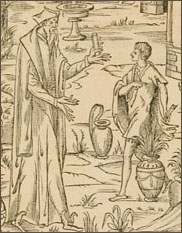| 
BOOKS ON ARCHITECTURE
| Author(s) |
De l’Orme, Philibert |
| Title |
Architecture… |
| Imprint |
Paris, R. II Chaudière, 1626 |
| Localisation |
Paris, Ensba, Les 1652 |
| Subject |
Architecture, Chimneys, Doors, Orders, Stereotomy |
|
|
Transcribed version of the text
|
French
The first
edition bringing together the Premier tome of 1567 and the
Nouvelles inventions of 1561, entitled Architecture de
Philibert De l'Orme appeared in 1626 from the presses of Regnault
II Chaudière, son-in-law and associate of Pierre Cavellat. He
was the son of Guillaume Cavellat who had republished De l'Orme's two
treatises in 1576 with Jérôme de Marnef. The two books
on carpentry conclude the treatise, becoming books X and XI.
It was natural
to bring the two books together, and De l'Orme surely imagined it while
he was alive : the very conception of the Premier tome which
goes from foundation to roof, naturally placed the two books devoted
to framework at the end. Nevertheless, numerous parts of the original
volumes were redundant. In this way Chaudière used the frame
from the title page of the 1576 Nouvelles inventions at the
end of the volume, at folio 318 v°, around the poem "ad Zoilum"
by Antoine Mizeault, alias "Meteorizomenos" (literally
"mis haut"). It was also necessary to choose among preliminary
pieces : Chaudière chose the dedication to Charles IX from the
1561 Nouvelles inventions, henceforth addressed "au roi",
without specifying any name. He reduced and adapted it so as to eliminate
a too precise reference. Likewise, the 1561 "avis au lecteur"
was copied with a few cuts. The decorative vignettes of the original
edition are reprinted but with the printer's mark and the motto "Omnia
cum tempore" replacing Philibert's coat of arms in the center and
the motto "Ne quid nimis". Finally, the work ends with two
conclusions : that of the Nouvelles inventions, then the one
from the Premier tome, with the representations of the good
and the bad architect.
The texts
themselves are treated in various ways. The text of the Premier
tome was only slightly modified, but the two books of the Nouvelles
inventions underwent several important cuts. Among others, chapter
3 of book I (which became book X) was simply deleted, and Chaudière
didn't take the trouble to renumber the chapters : the reader goes directly
from chapter 2 to chapter 4 (ff. 281 and 281 v°) ; besides, the
pagination is incorrect.
On the other
hand, and here is where this new edition is very interesting, the printer
added forty plates absent from the first editions, in part coming from
material De l’Orme prepared for the Second tome which
never saw the light of day. However, they are not all from the hand
of the architect. Twenty-three were borrowed from Fra Giocondo’s
(1511) and Jean Martin’s (1547) editions of Vitruve,
from Serlio’s books III and IV, from Bullant’s 1568 edition
of the Reigle and from other unidentified sources. In all likelihood these plates come from
the material Marnef and Castellat owned. They had printed Bullant’s
treatise and Martin’s and Goujon’s second edition of the
Vitruve in 1572. (This latter edition, like the 1547 edition,
reused numerous woodplates from Fra Giocondo and Cesariano). The other
plates can certainly be attributed to Philibert, in particular a sketchbook
placed between books VIII and IX, after folio 258 ; the second of these
plates bears the words "Ces figures icy se mettent après
le huictième livre". Beyond antique representations, there
are architectural projects : rustic garden temples, baths, the chevet
of the chapel at Anet, and a project for a general hospital. In addition,
the sketchbook shows caryatids and atlantes taken from Jean Martin’s
Vitruve.
Yves Pauwels (Centre d’Études Supérieures
de la Renaissance, Tours) – 2008
Critical bibliography
J.-M. Pérouse de Montclos, "Les éditions des traités
de Philibert De L’Orme au XVIIe siècle", J. Guillaume (ed.), Les
traités d’architecture à la Renaissance, Paris,
Picard, 1988, pp. 355-365.
J.-M. Pérouse de Montclos, Introduction à Philibert De
l’Orme, Traités d’architecture, Paris, Laget,
1988, pp. 15-17, 45-46.
|

